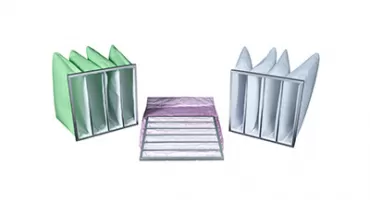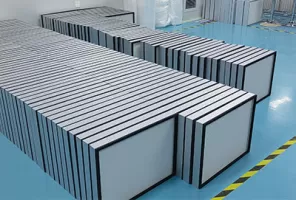 March 05, 2024
March 05, 2024
In the pursuit of healthier indoor environments, the role of air filtration systems cannot be overstated. Among the various types of air filters, chemical air filters stand out for their remarkable ability to target gaseous pollutants, volatile organic compounds (VOCs), and odors, thereby significantly improving indoor air quality. Let's delve into the science behind chemical air filters, exploring their composition, working principles, applications, and benefits.
Composition:
At the heart of chemical air filters lies activated carbon, a highly porous material derived from natural sources like coconut shells, wood, or coal. This activated carbon undergoes a process that increases its surface area, creating countless tiny pores. This expanded surface area enables activated carbon to adsorb a wide range of airborne chemicals effectively. Additionally, chemical air filters may incorporate other adsorbents like zeolites or potassium permanganate to target specific pollutants.
Working Principles:
The effectiveness of chemical air filters stems from the phenomenon of adsorption. As air passes through the filter, gaseous pollutants and odorous molecules come into contact with the activated carbon surface. The porous structure of activated carbon provides ample surface area for these molecules to adhere to, trapping them within the filter. This process effectively removes contaminants from the air, resulting in cleaner, fresher indoor air.
Applications:
Chemical air filters find applications across various indoor environments, including homes, offices, hospitals, laboratories, and industrial facilities. They are commonly integrated into HVAC systems to improve indoor air quality throughout entire buildings. Standalone air purifiers equipped with chemical filters are also popular for targeted air purification in specific rooms or areas where gaseous pollutants are a concern.
Benefits:
The benefits of chemical air filters extend far beyond mere odor elimination. By effectively removing harmful pollutants and VOCs from the air, these filters contribute to a healthier indoor environment. Improved indoor air quality can lead to numerous health benefits, including reduced respiratory symptoms, decreased risk of allergies and asthma, and enhanced overall well-being. Moreover, chemical air filters help create a more pleasant and comfortable living or working space by eliminating unpleasant odors and creating a fresher atmosphere.
In conclusion, chemical air filters play a vital role in enhancing indoor air quality by effectively targeting gaseous pollutants, VOCs, and odors. With their advanced adsorption capabilities and widespread applications, these filters offer a practical solution for maintaining a healthier and more comfortable indoor environment. As awareness of indoor air quality continues to grow, the importance of chemical air filters in promoting respiratory health and overall well-being cannot be overlooked.
 May. 29, 2024
Pocket Air Filters: A Comprehensive Guide
May. 29, 2024
Pocket Air Filters: A Comprehensive Guide
 Feb. 13, 2025
H14 Filter: Everything You Need to Know
Feb. 13, 2025
H14 Filter: Everything You Need to Know
 Aug. 22, 2023
Understanding the Correct Interpretation of Initial Pressure Drop for Pre-Filters
Aug. 22, 2023
Understanding the Correct Interpretation of Initial Pressure Drop for Pre-Filters

